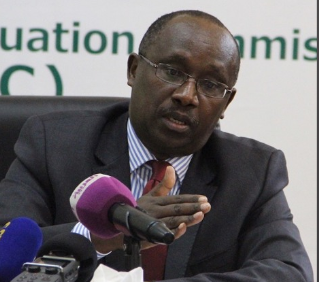The National Constitutional Amendment Committee (NCAC) has on Thursday presented the amended National Elections Act 2012 and the Southern Sudan Anti-Corruption Commission Act 2009 to the Ministry of Justice and Constitutional Affairs.
The two bills were presented to the Ministry of Justice by Gichira Kibara, the Chairperson for the NCAC.
Speaking to journalists after the presentation of the bills the NCAC chair said the two bills are meant to amend the National Elections Act and the Anti-Corruption Act to conform to the 2018 revitalized peace agreement.
“We have presented both bills and they make radical changes to the current laws to ensure that the laws conform with the best practices concerning conducting free, fair elections and also with regards to having a comprehensive legal framework for the fight against corruption,” Kibara said. “So, with regards to the Elections Act, we have made changes with regards to the independence of the commission. We expect that the national elections commission will be independent and will be able to conduct free and fair elections.”
Commissioner Gichira said they have also improved several processes necessary for the elections including elections petitions, setting up polling centers, and timelines for publishing voter registers.
“We have looked at all those issues and we hope that we have a much better law even in terms of creating the offenses for people who interfere with the elections process so that the elections process is free and fair,” he noted.
On the Anti-Corruption bill, Mr. Kibara said, “We have also reformed the laws substantially ensuring that there is a clear definition of corruption so that all those offenses can be prosecuted. We have also provided for the power of the anti-corruption commission to prosecute which is in accordance with the current constitution. The current law does not provide for the commission to prosecute because it is based on the interim constitution. We have made sure that the anti-corruption commission now can both investigate and prosecute the corruption cases.”
Kibara added that they have ensured that the anti-corruption bill conforms with international best practices, particularly the UN convention against corruption, including the recovery of corruption proceeds.
In his statement to the media after receipt of the two bills, the Ministry of Justice Undersecretary Dr. Gabriel Isaac speaking on behalf of the Minister of Justice Reuben Madol Arol said: “Today we received a very important bill for the people of South Sudan and we congratulate them that you will be having a national election law in place sooner than later. You will have the anti-corruption law in place soon to enable the concerned institution to combat corruption in the country.”
According to the ministry of Justice, the next step will be sending the bills to the cabinet and parliament before it is presented to the president to assent them into law.
“Simply the next step is that the bill will be presented as soon as possible by the minister of justice to the cabinet, then from the cabinet immediately it will be presented to the assembly, then after the assembly passes it, it will be assent by the president to become a law,” added Dr. Isaac.
The NCAC is established under Chapter 1, Article 1.18 of the Revitalized Agreement on the Resolution of the Conflict in the Republic of South Sudan (R-ARCSS). The core mandate of the Committee is to incorporate the Peace Agreement into the Constitution and draft amendments to other relevant legislation to conform to the Agreement.




